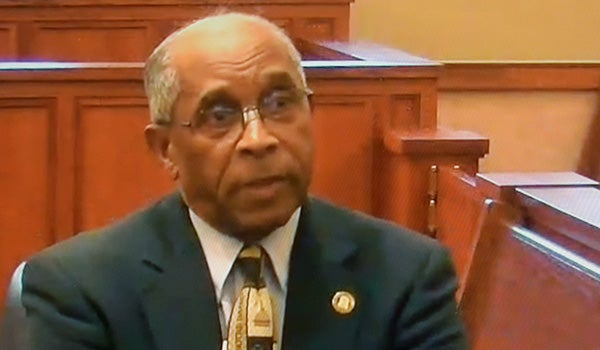SMC co-sponsors Law Day with Cass County Bar Association
Published 1:15 pm Tuesday, May 4, 2021

- Frank Williams
|
Getting your Trinity Audio player ready...
|
CASSOPOLIS — A local college teamed up with the Cass County Courts last week.
Southwestern Michigan College co-sponsored Law Day with the Cass County Bar Association April 30. Activities accomplished by linking SMC’s “Zoom Room” in the Barbara Wood Building on the Dowagiac campus with the Cass County Law and Courts Building in Cassopolis included JP4 Government CEO John Proos’s keynote address on “Advancing the Rule of Law Now” and the presentation of Liberty Bell awards to SMC alumna Mary Geegan Middleton of Dowagiac and Frankie Williams Jr., who retired in 2016 after 42 years as Cassopolis police chief. Proos presented from the college, while the recipients were with Chief Judge Susan Dobrich and Bar President Carol Montavon Bealor, Friend of the Court, in the Probate Court.
Williams’ award was presented virtually by 1959 classmate, longtime friend and Cass County favorite son, Dennis Archer, former Detroit mayor, Michigan Supreme Court Justice and president of the American, Michigan and Wolverine bar associations.
Attorney Leon Letter, SMC School of Business chair, introduced Professor Dr. Mary Young-Marcks for a presentation on SMC’s civic-engagement efforts with students.
Archer, who spoke at SMC in October 2013, said Williams “has spent his life serving the public to advance the rule of law in our community with compassion and care. Frankie is loved by the community he serves. He epitomizes the idea of community policing. He knows everybody and everybody knows Frankie Williams. He spent eight years in the U.S. Air Force and earned two college degrees. His 42-year stint as top cop is very rare. The national average is between two and five years. Frankie and his wife Sukey have worked and been a part of the entire fabric of Cass County. Both Frank II and Andy, are Michigan State Police troopers.”
In fact, the sons missed the Cassopolis ceremony to attend Frank II’s MSP retirement after 26 years.
“Frankie may have retired, but he is not through working for Cassopolis and Cass County,” Archer said. “I’m honored to have this given through me in this Zoom setting to a person that I’ve always respected, and we’ve always remained friends.”
Judge Dobrich introduced Middleton, chief executive officer of the Cassopolis Family Clinic Network, a Federally-Qualified Health Center.
“Mary has been the driving force in the success of the Cassopolis Family Clinic,” Dobrich said, “and has expanded its impact in our community with accomplishments such as state-of-the-art facilities which employ over 130 people. That facility used to be smaller than this courtroom. She started as an insurance biller. With her desire to see better health care in this community, her vision created that state-of-the-art facility. Not only did she do that for Cassopolis, she recently expanded that same concept to Niles,” including behavioral health care services that work in partnership with courts and jail.
Proos, awarded the first Liberty Bell for outstanding service by non-lawyers in 2017, served as 79th District State Representative (2005-2010) and as 21st District State Senator (2011-2018) after working at the federal level for U.S. Rep. Fred Upton.
Proos depicted the rule of law as a sort of solar system with such concepts as due process, predictability, stability, enforceability/accountability and transparency arrayed around it like planets orbiting the sun.
“Rule of law is a complicated topic based on very simple premises,” Proos said. “It underpins everything we do. In Michigan, with the pandemic, you saw a significant fight between the Legislature and Gov. Gretchen Whitmer, trying to provide safety and security for every one of us. She based executive orders on two separate statutes she used interchangeably, one 1945 and one 1976. The Legislature sees a need and interfaces with the current law to change the statute. The Supreme Court ruled the 1945 statute was not appropriate and she was no longer able to use executive orders to manage the pandemic response. She then shifted to the 1976 statute, which allowed emergency powers to be granted through the Department of Community Health. The court system is the backstop.”
“Rule of law forces us to think through whether we can be better, more transparent, more effective and find our way to a more enlightened position if necessary,” Proos said.






